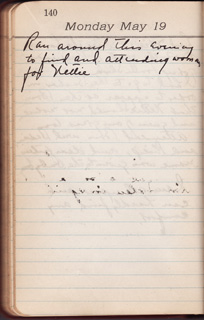
Nettie gave birth to a baby boy
visited her at Hospital she
is weak.
Like through some misterious
power I feel downhearted.
Today,
Wired home to Europe
the news of the birth.
——-
Matt’s Notes
This is the second birth of a nephew, the second trip to the maternity ward, the second dash to the Western Union telegraph office for Papa in the last six weeks. Why, though, should such an event make him feel “downhearted,” a reaction so incongruous it feels like the work of a “misterious power?”
I’m sure Papa’s longing for a family of his own and for the family he left behind in Europe are partly responsible. We’ve seen, on several occasions, how holidays or milestone events served to bring those deep and difficult feelings to the fore, affecting Papa with sudden, seemingly inexplicable depression.
The birth of his other sister Clara’s son back in late March didn’t have the same effect, but the circumstances were different in several ways. Papa was in the opening throes of what he thought to be a burgeoning romance at the time, so perhaps the birth of his nephew contributed to an overall sense of optimism. The romance fizzled, though, plunging Papa into a long bout of gloom over his domestic prospects; maybe the birth of Nettie’s son reminded him of his disappointment and seemingly insoluble bachelorhood.
Nettie also already had a child named Ruchaly, but she was sickly and had, in fact, just experienced a serious illness a few months earlier. I gather that Nettie and her husband Phil were in difficult financial straits — Papa had recently been giving them financial support while Phil was out of work — so I’m sure the birth of their new child would have made Papa more than a little concerned.
Finally, we need to remember that Papa’s father had taken a bad fall at the end of February and still hadn’t recovered. Though he wouldn’t have written it down or acknowledged it to himself, he must have struggled mightily with the thought that his father might never see Nettie’s new son.
————-
I transcribed the fourth line of this entry as “Life brought some misterious new power,” but I’m not sure I’m reading the first two words right. Here’s the line in Papa’s handwriting:

Did I transcribe it correctly?
—————
Update: I’ve looked at this again and I the words are “Like through.” I’ve changed the tranncription above accordingly.
 Visited Rose Sherman,
Visited Rose Sherman,





